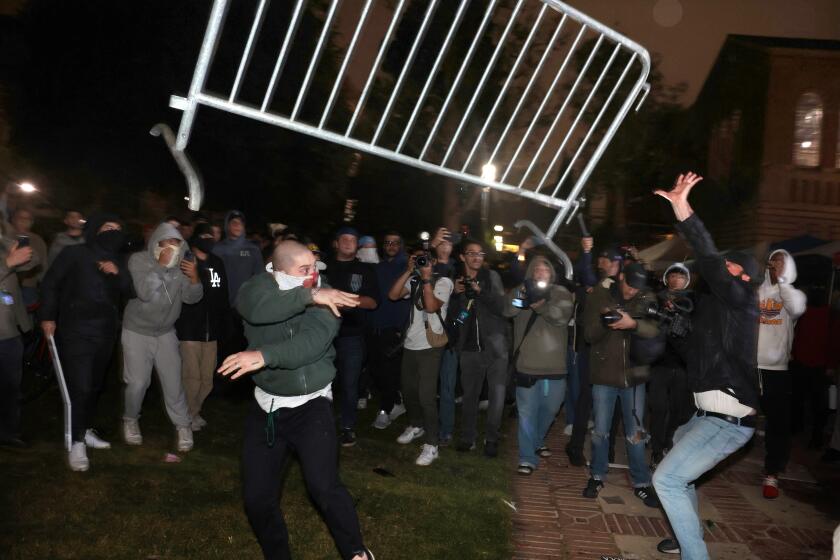Editorial: Is Sheriff Villanueva going to kick ICE out of L.A.’s jails or isn’t he?
The most contentious part of Los Angeles County Sheriff Civilian Oversight Commission meetings generally comes at the beginning, during public comment, when anti-illegal-immigration activists voice their disgust at Sheriff Alex Villanueva for limiting his cooperation with federal immigration officers.
They are almost always answered from the audience or from the microphone by activists of a contrary bent who complain that Villanueva still works too closely with U.S. Immigration and Customs Enforcement, generally referred to as ICE, in its quest to deport released inmates who are in the country without authorization. When the back-and-forth gets too hot, the commission often takes a break and reconvenes to conduct its regular business.
But not last Tuesday, when the disagreement turned to hostile shouting and the commission abruptly ended its meeting.
The incident demonstrates Villanueva’s predicament, which The Times explored the same day as the curtailed meeting in a front-page story by staff writer Maya Lau.
Villanueva was a recently retired sheriff’s lieutenant who surprised observers by challenging and then defeating Sheriff Jim McDonnell late last year. He did it with the backing of an unlikely coalition — sheriff’s deputies who complained that they were suffering from unfair and random discipline, and progressive activists, including advocates for immigrant rights.
Enter the Fray: First takes on the news of the minute »
During his campaign, Villanueva vowed to “kick ICE out of the jail.” He also offered more nuanced points about how he intended his policy to roll out. For example, ICE agents wouldn’t be allowed in the building but could wait in the adjacent courtyard, where sheriff’s officials would continue to hand over inmates whose jail sentences had ended. But many supporters chose to hear what they wanted to hear: a promise of total non-cooperation with federal immigration agents.
Many of them are now disappointed. Villanueva is not the bulwark against deportations that they had hoped he would be.
The Times editorial page was skeptical of Villanueva as a candidate because of his lack of command experience, and in the middle of his first year in office, we remain deeply concerned about his rehiring of deputies who had been fired for cause by the previous sheriff. — and whose terminations had been upheld by the Civil Service Commission. These reversals threaten hard-won reforms that were recommended in a landmark 2012 report studying use of force by deputies against county jail inmates. We question the degree to which Villanueva’s supporters on the progressive end of the spectrum really understood his politics when they cast their votes.
On the issue of jail, immigration officials and deportation, however, Villanueva — whether by meticulous policy decisions or balancing of political pressures — has landed in a good, if controversial, place.
The minute details of sheriff-ICE interaction do not strike us as being of primary importance. We see little difference between whether an inmate who served time for committing a serious or violent crime, and who is not authorized to be in the country, is released to an ICE agent or a contractor working for ICE, or whether the hand-off takes place in the courtyard, the bus bay or the jail lobby entrance. The important point is that ICE doesn’t have the run of the jail or other secure areas, for example in courthouses, and that the Sheriff’s Department is spending its time and money doing its own work, not the federal government’s. It’s not holding inmates past their release dates because of an ICE request. And those who are indeed released to ICE are only the most serious offenders.
Despite the fact that the word “sanctuary” is used in describing SB 54 — the state law that bars use of state or local resources for immigration enforcement — the law does not and should not be used to hide or shield perpetrators of serious crimes from federal authorities. The point is not to impede ICE agents but to make it clear to jail inmates, their families, witnesses and tipsters that contacting the Sheriff’s Department to seek help or provide information will not result in being turned over to ICE for deportation.
The program Villanueva began rolling out earlier this year accomplishes that. The Civilian Oversight Commission and immigrant advocates are urging the sheriff to further limit the department’s contact with ICE. Over time, some adjustments may be warranted. But for the most part he seems to have struck a good balance.
Follow the Opinion section on Twitter @latimesopinion and Facebook
More to Read
A cure for the common opinion
Get thought-provoking perspectives with our weekly newsletter.
You may occasionally receive promotional content from the Los Angeles Times.






